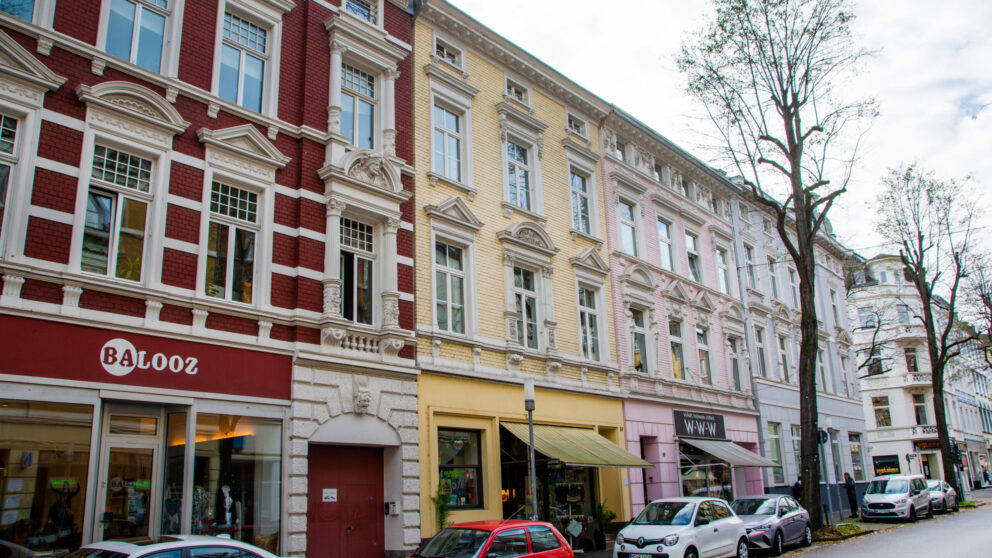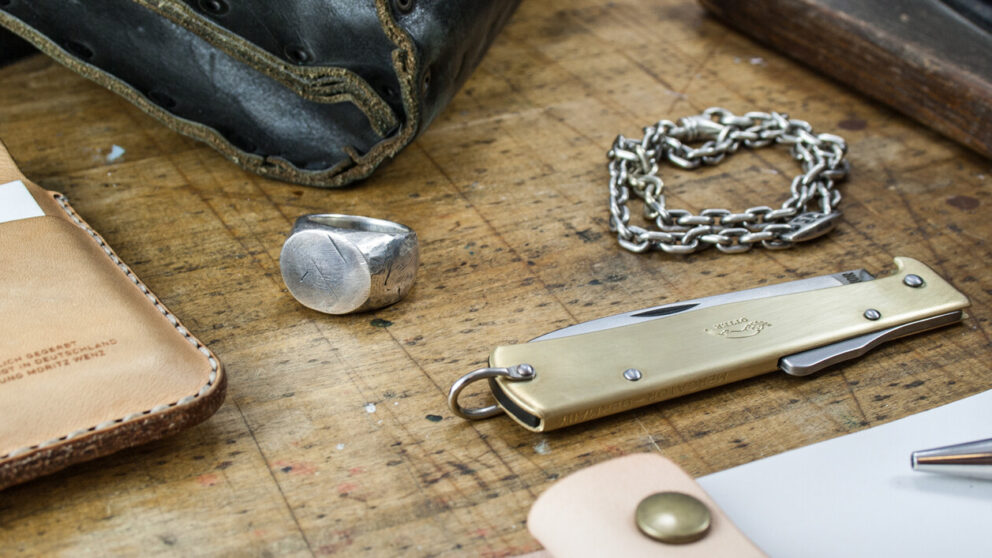
Six famous Düsseldorf specialities you definitely need to try

Six famous Düsseldorf specialities you definitely need to try
From bar snacks to mustard roast
Traditions can often feel somewhat odd and antiquated, especially those that relate to food and eating. And it’s obviously quite a thrill to taste your way through the crossover cuisines of the world or to try something new and daring in your own kitchen. Using ingredients from a Japanese supermarket, say, or some other exciting place that sells unusual foods. But, this being Düsseldorf, our culinary heritage integrates seamlessly with our cosmopolitan outlook on life. If that all sounds a bit abstract, then simply start off by visiting some of Düsseldorf’s brewpubs. There are also plenty of other pubs, bars and restaurants – first and foremost those in the Old Town – where you can discover how to celebrate heritage in a very contemporary way. Here are six specialities that you should definitely get to know, or rediscover.
Altbier
The Rhineland and its people are celebrated in many a traditional drinking song. While you won’t need a stiff drink or two before you can appreciate the charms of Düsseldorf, a tasty ‘dröppke’, or tipple, would certainly not diminish the city’s appeal. The tradition of brewing altbier – the city’s signature beer – goes back all the way to the ancient Romans, and some of Düsseldorf’s brewpubs have their roots in the 19th century. So a guided altbier tour provides not only calorific but also historical value. Or you could just dispense with the guide and simply head straight for the local bar of your choice. Failing that, there’s always the ‘longest bar in the world’. Düsseldorf’s Altstadt (Old Town) has more than 250 pubs and bars, many of which serve the top-fermented altbier with its distinctive dry, full-bodied flavour – in the traditional 0.25 litre glass, of course. In the summer, pub-goers largely move outside, for example onto Ratinger Strasse, or ‘Retematäng’, as the locals also call it. Düsseldorf brewpubs usually serve local speciality food along with their freshly drawn beer – perfect if you need to line your stomach for a pub crawl or a night of partying. So if that’s what you’ve got in mind then pay particularly close attention to the following tips and try out the tasty culinary titbits on offer to go with your altbier.
For more about tasty tipples, the old-established brewpubs and the more recent microbreweries see: https://www.duesseldorf-tourismus.de/erleben/essen-und-ausgehen/brauereien
Halve hahn
Caution, confusion alert! Despite its name, a halve hahn has nothing to do with chickens – an easy mistake that even locals make from time to time. Rather, it is half a humble traditional rye bread roll – also known as ‘röggelchen’ in the Rhineland – with gouda cheese. Depending on where you have it, the halve hahn is served with butter, frequently also with gherkins, and, very importantly, always with strong mustard, known locally as ‘mostert’. Sometimes the plate is garnished with raw onions, while the assembly of the ingredients is traditionally left to the guest. The appropriate drink to accompany this classic Altstadt snack would be a freshly drawn altbier, of course. How the halve hahn acquired its misleading name remains disputed. Legend has it that it was originally a break-time snack for the köbesse, or brewery pub waiters, and that the ‘hahn’ it refers to is the tap on the beer barrel rather than a rooster. Unlike altbier, the halve hahn is available in both Düsseldorf and Cologne – which are rival cities that famously can’t agree on anything.
Düsseldorf senfrostbraten
“Jede Jeck es anders” (everyone is different), an exhortation to accept people as they are, is one of a list of expressions known as the ’Rules of the Rhineland’. One of the great things about Düsseldorf’s brewpub tradition is its openness. If you’re just popping in for a swift drink with your friends, you’ll be more than welcome. But should you happen to get bogged down in conversation and become a bit peckish, then a bierhappen – literally a ‘beer bite’, i.e. a snack, such as a halve hahn – will be on hand to take care of it. Alternatively, you could opt to all have dinner together, pre-planned or on the spur of the moment. The brewpubs are renowned for their excellent Rhineland cooking. Anyone who enjoys a hearty meat dish now and again really ought to try Düsseldorf senfrostbraten. This is a rump steak that’s fried medium rare and then gratinated with a mustard and onion paste, leaving it juicy on the inside and crispy on the outside. However, the devil is in the detail, as is so often the case. Which precise mustard should be added to the caramelised onions? What about breadcrumbs? The list of questions goes on, and the exact recipes are well-guarded secrets. When it comes to side dishes, freshly fried potatoes and a small salad are the most popular options. It’s hard to say whether a Düsseldorf senfrostbraten qualifies as tasty rustic fare or if it simply defies definition. Suffice it to say that this local favourite also features on the menus of many fine dining restaurants. When something is this good, taste trumps everything.
Mustard
Have you been paying close attention to our food tips so far? Then you can’t have failed to notice that Düsseldorf is a city that’s keen on mustard, whether it’s being used to spice up a halve hahn or providing a crucial ingredient for a perennial favourite like Düsseldorf senfrostbraten. Obviously the mustard needs to be hot rather than sweet like in Bavaria. Four Düsseldorf mustards have had their designation of origin protected across the EU. The oldest of these, Aechter Düsseldorfer Mostert (authentic Düsseldorf mustard), was first produced in 1726 and is made the same way to this day. The brown and yellow mustard seeds are ground using a 500 kilogramme granite millstone. The finished product always comes in a stoneware pot – a tradition that is so deeply rooted in Düsseldorf that the start of the carnival season on 11 November is marked by the Hoppeditz, the carnival’s symbolic figurehead, climbing out of a mustard pot in front of the city hall. Despite all that history, Düsseldorf’s mustard makers are more than capable of blending tradition with the present and the future, as is evident from creative new recipes such as horseradish, wild garlic and even altbier mustard.


Himmel un Ähd
The exception proves the rule, however, and this popular dish makes do without any mustard at all. It is called ‘Himmel un Ähd’ (heaven and earth), a veiled reference to its main ingredients. The apples for the apple sauce that gives this local staple its tangy freshness grow on trees at a lofty height, while potatoes, also known as ‘earth apples’ in German, are cultivated below ground. They provide the second essential component, mashed (or smashed) potatoes. So in principle Himmel un Ähd would be a vegetarian dish. However, although it’s not mentioned in the name, most people consider fresh blood sausage – sliced, dusted with flour and briefly fried on both sides (caution: may disintegrate) – to be another indispensable component. Connoisseurs will also insist on fried onions. This is another Rhineland speciality that has any number of different interpretations. There are even rumours of a Japanese version that comes with a seaweed salad. One thing is certain, even Düsseldorf’s Michelin-starred chefs have had a go at creating their own takes on Himmel un Ähd. Which is understandable, given that this dish is both heavenly and down-to-earth. A definite must-try.
Herbal liqueur
It may not have escaped your notice that Düsseldorf’s traditional specialities can be a bit on the hearty side, and what better way to round off a nice, solid meal than with a herbal liqueur? Just as well then that Düsseldorf’s expertise doesn’t end with top-fermented beer but also includes some more potent options. Killepitsch, at 42 per cent of alcohol by volume, should be strong enough to settle your stomach. It’s also a treat for your taste buds, being made with up to 98 different herbs, berries and fruit from around the world. Completely natural ingredients, a subtly bitter taste, careful production methods based on time-honoured recipes – those are all good reasons to opt for Düsseldorf’s most popular herbal liqueur. As nice as it tastes, it’s even better when enjoyed in good company, which you’ll get free of charge in any of the numerous pubs, bars and kabüffkes that serve Düsseldorf’s favourite spirit. Especially in the Old Town, Killepitsch is immensely popular, and it’s also much in demand far beyond the boundaries of the city and even the region. If you would like to learn more about its production you should visit the new Killepitsch factory in Düsseldorf’s MedienHafen, which literally has glass walls so you can see what’s going on.
This article is supported by REACT-EU.
Title image: Düsseldorf Tourism




